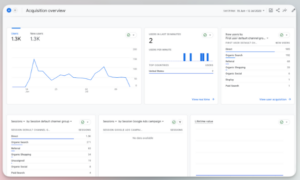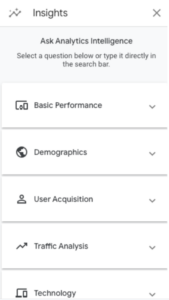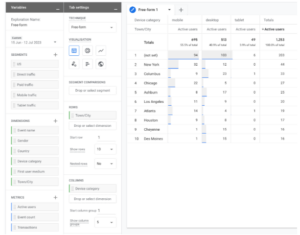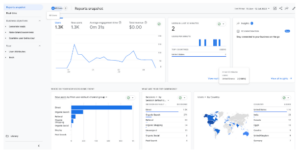What Built World Companies Need to Know About Google Analytics 4
Google is changing one of the tools you’ve been relying on to grow and succeed. If you’re not aware of it, you’re already losing valuable data.
It’s impossible to tell good marketing from bad marketing just by looking at it. That’s because good marketing is marketing that gets results, and you can’t see those results without popping open the hood and looking past the surface.
Too many built world companies never dig that deep. Instead of measuring the concrete results of their marketing efforts, they judge their success on superficial measures. They pat themselves on the back because the boss thinks the new website looks sharp. They consider the trade show a success because they drummed up a lot of interest. But they don’t measure the things that actually matter, like how much traffic the website generates or how many of those trade show leads become sales.
That’s like buying a car because you like the paint job but never actually taking it for a test drive to see how well it runs.
Good marketing is critical to ensuring the continued success of your business. You should never leave it up to chance. Every aspect of it can and should be measured.
That means using the right measurement tools. And one of the best for tracking your website’s performance is Google Analytics – or as it’s formally known, Universal Analytics (UA). It’s powerful, it’s tied directly to the search engine your customers are using to find you and it’s free.
If you’re keeping tabs on your marketing, there’s a very good chance you’re making heavy use of Google Analytics. But Google is sunsetting Analytics as we know it.
As of July 1st, 2023, Google has ceased collecting data through UA. By December 2023, all historical UA data will be deleted. In its place, they’re rolling out Google Analytics 4 (GA4). Companies that don’t transition to GA4 will be missing out on key data they need to improve their digital marketing and grow their business.
Google will not be automatically updating current users to the new version. Every building material company has to take active steps to continue tracking their performance.
After seeing an influx of questions about GA4 from built world companies who aren’t sure what the change means for them or what they have to do in response to it, we’ve put together a guide about this major and potentially disruptive update.
Why Google Moved Forward with GA4
GA4 came out of an increasing demand for user privacy and a desire to provide businesses with a more holistic view of customers’ journeys across their websites and apps. GA4 is designed to better handle multiple data types while also complying with privacy regulations such as GDPR and CCPA.
Unique Features of GA4

- A New Data Model
Unlike its predecessor, Universal Analytics, which used a session-based model, GA4 employs a user-based model and collects data in the form of events. Each event has a unique name and additional parameters to describe it. This allows for incredibly detailed metrics without infringing on user privacy.
- AI-Powered Insights and Predictions
GA4 uses machine learning technology to provide AI-powered insights and predictions. This feature can highlight trends, such as growing interest in a particular product, and predict outcomes like churn rates and potential conversions. These insights can help you promote the right products and target relevant audiences.

- Complete View of the Customer Lifecycle
GA4 offers customer lifecycle-framed reporting, providing a comprehensive view of how users engage with your website across different devices and channels. This feature can help you understand which channels are driving customers to your website and how they engage after converting.
- More Control Over User Data
GA4 provides granular data controls to help businesses comply with data regulations. It also makes it easier to handle user data removal requests, providing a more privacy-focused approach to data analytics.
- SPAM Prevention
GA4 has found a way to address the problem of spam referrals. Only hits with a secret key can send data to a GA4 property, preventing spammers from sending fake data to your analytics account.
- Cross-Platform Tracking
GA4 introduces cross-platform tracking, allowing you to track user behavior across both your website and mobile app. This feature provides a more comprehensive view of the customer journey, helping you understand how users interact with your brand across different platforms.
- Customizable Dashboard
GA4 offers a customizable dashboard, enabling you to tailor your view to the reports that matter most to your business. This feature allows you to focus on the data that’s most relevant to your goals, making it easier to track your progress and make informed decisions.
- Predictive Metrics
GA4’s predictive metrics use AI to forecast future consumer behavior. This feature can significantly impact your marketing strategies, allowing you to target audiences based on their predicted behaviors and create more effective, personalized campaigns.
- Enhanced Measurement
GA4 automatically measures some interactions, such as scrolls, clicks, and video engagement, without the need for additional coding. This feature simplifies the tracking process and ensures you don’t miss out on valuable data.
- Integration with Google Ads
GA4 integrates seamlessly with Google Ads, allowing you to create audiences and view your campaign performance directly within GA4. This feature makes it easier to manage your marketing efforts and measure your return on investment.
- Event Modification and Creation
GA4 allows you to modify and create events directly within the interface without having to adjust the code on your website. This feature simplifies the process of tracking specific user interactions on your site.
- Life Cycle Reporting
GA4 organizes reports around the customer life cycle, providing insights into acquisition, engagement, monetization and retention. This feature allows you to understand each stage of the customer journey and identify areas for improvement.

- Advanced Analytics
GA4 offers advanced analysis techniques, such as funnel analysis and segment overlap. These techniques provide deeper insights into your data and help you understand the nuances of your audience’s behavior.

Why Built World Companies Should Move from Universal Analytics to GA4 – ASAP!
Switching to GA4 may be challenging if you’re used to Universal Analytics, but it offers powerful features and crucial privacy controls you can’t ignore for much longer. Since GA4 is forward-facing, historical data won’t be available. The earlier you make the transition, the more information you’ll have to mpa user journeys and explore new analysis tools.
Remember, UA stopped collecting data in July 2023, and historical data will be deleted in December 2023. Eventually, you’ll have no choice but to switch. Setting up GA4 now allows you to gather nearly a year of comparative data, enabling you to establish a valuable baseline despite significant changes in bot filtering and modeling between the two platforms.
Need Help Getting Set Up?
Take the hassle out of transitioning to GA4. ParadigmNEXT’s network partners can guide you through the setup process. Contact us today to get started on your seamless transition to GA4, maximizing your data insights and staying ahead in the ever-evolving digital landscape.